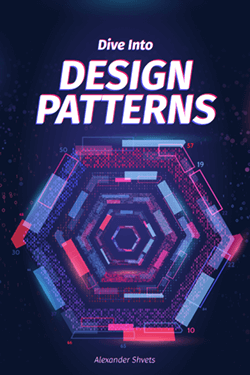Abstract Factory Design Pattern in C++: Before and after
Trying to maintain portability across multiple "platforms" routinely requires lots of preprocessor "case" statements. The Factory pattern suggests defining a creation services interface in a Factory base class, and implementing each "platform" in a separate Factory derived class.
Before
The client creates "product" objects directly, and must embed all possible platform permutations in nasty looking code.
#include <iostream>
#define LINUX
using namespace std;
/**
* Abstract base product.
*/
class Widget {
public:
virtual void draw() = 0;
};
/**
* Concrete product family 1.
*/
class LinuxButton : public Widget {
public:
void draw() { cout << "LinuxButton\n"; }
};
class LinuxMenu : public Widget {
public:
void draw() { cout << "LinuxMenu\n"; }
};
/**
* Concrete product family 2.
*/
class WindowsButton : public Widget {
public:
void draw() { cout << "WindowsButton\n"; }
};
class WindowsMenu : public Widget {
public:
void draw() { cout << "WindowsMenu\n"; }
};
/**
* Here's a client, which uses concrete products directly.
* It's code filled up with nasty switch statements
* which check the product type before its use.
*/
class Client {
public:
void draw() {
#ifdef LINUX
Widget *w = new LinuxButton;
#else // WINDOWS
Widget *w = new WindowsButton;
#endif
w->draw();
display_window_one();
display_window_two();
}
void display_window_one() {
#ifdef LINUX
Widget *w[] = {
new LinuxButton,
new LinuxMenu
};
#else // WINDOWS
Widget *w[] = {
new WindowsButton,
new WindowsMenu
};
#endif
w[0]->draw();
w[1]->draw();
}
void display_window_two() {
#ifdef LINUX
Widget *w[] = {
new LinuxMenu,
new LinuxButton
};
#else // WINDOWS
Widget *w[] = {
new WindowsMenu,
new WindowsButton
};
#endif
w[0]->draw();
w[1]->draw();
}
};
int main() {
Client *c = new Client();
c->draw();
}
Output
LinuxButton LinuxButton LinuxMenu LinuxMenu LinuxButton
After
The client receives a platform-specific factory object, which encapsulates use of "new" operator. Client delegates all creation requests to this factory.
#include <iostream>
#define LINUX
using namespace std;
/**
* Abstract base product. It should define an interface
* which will be common to all products. Clients will
* work with products through this interface, so it
* should be sufficient to use all products.
*/
class Widget {
public:
virtual void draw() = 0;
};
/**
* Concrete product family 1.
*/
class LinuxButton : public Widget {
public:
void draw() { cout << "LinuxButton\n"; }
};
class LinuxMenu : public Widget {
public:
void draw() { cout << "LinuxMenu\n"; }
};
/**
* Concrete product family 2.
*/
class WindowsButton : public Widget {
public:
void draw() { cout << "WindowsButton\n"; }
};
class WindowsMenu : public Widget {
public:
void draw() { cout << "WindowsMenu\n"; }
};
/**
* Abstract factory defines methods to create all
* related products.
*/
class Factory {
public:
virtual Widget *create_button() = 0;
virtual Widget *create_menu() = 0;
};
/**
* Each concrete factory corresponds to one product
* family. It creates all possible products of
* one kind.
*/
class LinuxFactory : public Factory {
public:
Widget *create_button() {
return new LinuxButton;
}
Widget *create_menu() {
return new LinuxMenu;
}
};
/**
* Concrete factory creates concrete products, but
* returns them as abstract.
*/
class WindowsFactory : public Factory {
public:
Widget *create_button() {
return new WindowsButton;
}
Widget *create_menu() {
return new WindowsMenu;
}
};
/**
* Client receives a factory object from its creator.
*
* All clients work with factories through abstract
* interface. They don't know concrete classes of
* factories. Because of this, you can interchange
* concrete factories without breaking clients.
*
* Clients don't know the concrete classes of created
* products either, since abstract factory methods
* returns abstract products.
*/
class Client {
private:
Factory *factory;
public:
Client(Factory *f) {
factory = f;
}
void draw() {
Widget *w = factory->create_button();
w->draw();
display_window_one();
display_window_two();
}
void display_window_one() {
Widget *w[] = {
factory->create_button(),
factory->create_menu()
};
w[0]->draw();
w[1]->draw();
}
void display_window_two() {
Widget *w[] = {
factory->create_menu(),
factory->create_button()
};
w[0]->draw();
w[1]->draw();
}
};
/**
* Now the nasty switch statement is needed only once to
* pick and create a proper factory. Usually that's
* happening somewhere in program initialization code.
*/
int main() {
Factory *factory;
#ifdef LINUX
factory = new LinuxFactory;
#else // WINDOWS
factory = new WindowsFactory;
#endif
Client *c = new Client(factory);
c->draw();
}
Output
LinuxButton LinuxButton LinuxMenu LinuxMenu LinuxButton
